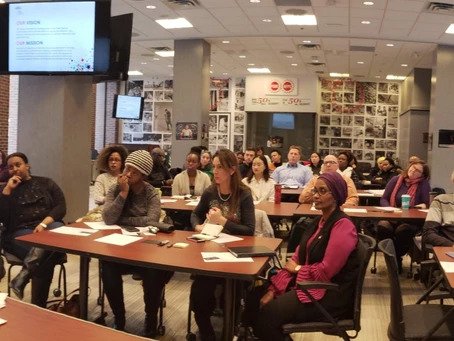We are delighted to celebrate the recent formation of Black educators networks at the two English language school district boards in Ottawa (OCDSB and OCSB). There are many other Black educators networks in Ontario including Ontario Alliance of Black Educators, the Durham Black Educators Network, the African Heritage Educators’ Network, the Peel Association of African Canadian Educators, and the Windsor Black Educators Association. For those unfamiliar with Black educators networks, we wanted to explain what they are and why they are important.
What types of things do Black educators networks do?
Generally, these kinds of networks support the success of Black students, work to increase Black parental engagement, and promote leadership and mentorship opportunities for Black educators. They also support culturally relevant and responsive instruction and assessment of Black students 365 days a year, and support strategies to recruit, hire, and develop Black educators.
Why are Black educators networks necessary?
A 2017 report entitled Towards Race Equity in Education compiled by Dr. Carl James, Jean Augustine Chair in Education, Community & Diaspora at York University, the African Canadian Legal Clinic, and the Ontario Alliance of Black School Educators, and Tana Turner of Turner Consulting demonstrated clear inequities in the educational outcomes for Black children, including:
- Lower percentages of Black students in academic programs, compared white and other racialized students
- Black students were more than twice as likely to be enrolled in the applied program compared with white and other racialized students
- Higher percentages of Black students who had been suspended at least once prior to finishing high school compared to white and other racialized students
We do not have comparable data for the Ottawa area, although the Ottawa-Carleton District School Board has begun its identity-based data collection and analysis. We do know from listening to the lived experiences of our community that anti-Black racism is present and ongoing in our Ottawa-area schools, and that anti-Black racism harms Black students, educators, staff, and families. We also know that supporting students’ and educators’ well-being, ensuring culturally relevant and culturally responsive learning environments and curricula in every classroom, and increasing the number of Black educators and administrators improves outcomes for Black students.
Non-Black students also benefit from the elimination of anti-Black racism; their learning experiences are more robust, they see their own place in the world more authentically, and they value the experiences and contributions of their Black peers. Communities are stronger and more resilient when non-Black students see the humanity and value of Black students and educators.
But isn’t this reverse racism?
No. Racism can be understood as both personal and systemic. Personal racism is an individual holding assumptions and/or beliefs or acting in ways that are discriminatory. Systemic racism “includes the policies and practices entrenched in established institutions, which result in the exclusion or promotion of designated groups. It differs from overt discrimination in that no individual intent is necessary.” Reverse racism is a myth. According to the Alberta Civil Liberties Research Centre:
“Assumptions and stereotypes about white people are examples of racial prejudice, not racism. Racial prejudice refers to a set of discriminatory or derogatory attitudes based on assumptions deriving from perceptions about race and/or skin colour. Thus, racial prejudice can indeed be directed at white people (e.g., white people can’t dance) but is not considered racism because of the systemic relationship of power. When backed with power, prejudice results in acts of discrimination and oppression against groups or individuals. In Canada, white people hold this cultural power due to Eurocentric modes of thinking, rooted in colonialism, that continue to reproduce and privilege whiteness.”
“Ricky Sherover-Marcuse asserts that “we should not confuse the occasional mistreatment experienced by whites at the hands of people of color with the systematic and institutionalized mistreatment experienced by people of color at the hands of whites” (“A Working Definition of Racism,” p. 2). While expressions of racial prejudice directed at white people may hurt the white person/people individually or personally, and are never to be condoned, they do not have the power or authority to affect the white person’s social/economic/political location and privileges.”
Are you sure that creating a space for Black educators to connect and support one another isn’t discriminatory to white educators?
Yes. Learning to understand why Black-centered and Black-led places are critically important can be facilitated by reading the following books:
1. So You Want To Talk About Race by Ijeoma Oulo
2. White Fragility by Robin DiAngelo
3. How To Be An Antiracist by Ibram X. Kendi
We’ve considered hosting a community book discussion around these books–let us know in the comments if you are interested!




